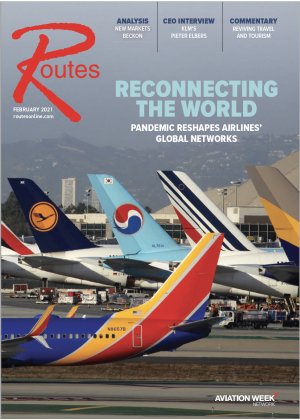Interview: KLM CEO and president Pieter Elbers on COVID-19 recovery

How is the recovery of your network progressing?
The sequence for me is destinations first, capacity later. We used to have a network in the range of 60 to 70 long-haul destinations and we have recovered roughly 70% of that. More recently, we’ve also been able to get back some of our flights to China. Enormous cargo demand enables us to fly these routes even though we have very low passenger numbers.
On our European network, we usually have some 80 to 90 destinations. Around 90% of them have now been restored, but with about 50% of the capacity and one-third of the passengers. We’re looking for new opportunities at the same time. There are opportunities to connect mostly smaller European cities through Amsterdam (AMS) as I believe the hub-and-spoke model will lead the recovery in terms of long-haul traffic.
Why are you so confident in the long-term viability of the hub-and-spoke model?
People need to travel from smaller cities in Europe to other places in our network. We serve around 60 to 70 long-haul destinations, as well as an extensive partner network in the US and China. We are able to provide these traffic flows a service they would not get otherwise.
Looking at the long-haul side, a lot of the thinner routes between midsize European cities and midsize US cities were established over the past few years—which were good economic years with solid demand. Obviously with the step back we are taking now, those routes can no longer sustain direct flights. Traffic is therefore going to be channeled through hubs.
How can airports and tourism authorities influence what services are resumed and what new routes launched?
It’s important that airports have a flexible approach and can support us with market data and information on their operational facilities. There’s still a lot of uncertainty for consumers over whether they need to have COVID tests or not, as well as the exact rules and regulations for travel. There needs to be close cooperation between airports and our network team to ensure passengers can travel safely.
We’re clearly looking for new opportunities. If there are any airports out there with a good proposal and business case, we’re here for you.
Will price be a key factor in the speed that traffic returns?
Right now, I don’t think price is a key factor. The main thing determining traffic return is confidence. Over the past few months, we have been confronted with different rules, different regulations and different protocols across every country where we operate.

Routes February 2021
There needs to be a more collaborative approach and a shorter, pragmatic way to address safety measures.
Do you think the pandemic will create fundamental change in the way airlines, airports and passengers behave?
Some of the underlying trends that were present before COVID are being accelerated now, particularly around digitalization and sustainability. In 2019, we launched a ‘fly responsibly’ campaign which called on people to take a more cautious approach on whether to fly or not. There are some people predicting that consumers will choose not to fly at all post-COVID. I don’t think that will be the case, but people will put more emphasis on how the airline and the airport deal with sustainability.
So will flight shaming be as high up the agenda as it was pre-COVID-19?
A lot of the discussion before the pandemic focused purely on flight shaming and not about how are we working together to make the industry more sustainable. That hid some of the massive benefits of aviation. I think during the crisis people have seen our industry’s value to society, especially around the repatriation flights. Airlines like KLM and Air France are also now ready to start transporting vaccines around the world.
But we remain focused on sustainability—in the short term around the use of sustainable fuels, in the mid term we’ll start to invest in a biofuels factory and in the long term, close collaboration with some of the OEMs to develop new aircraft. With that, I think KLM will be building back better and I see many other airlines embracing that philosophy.
Photo credits: KLM




